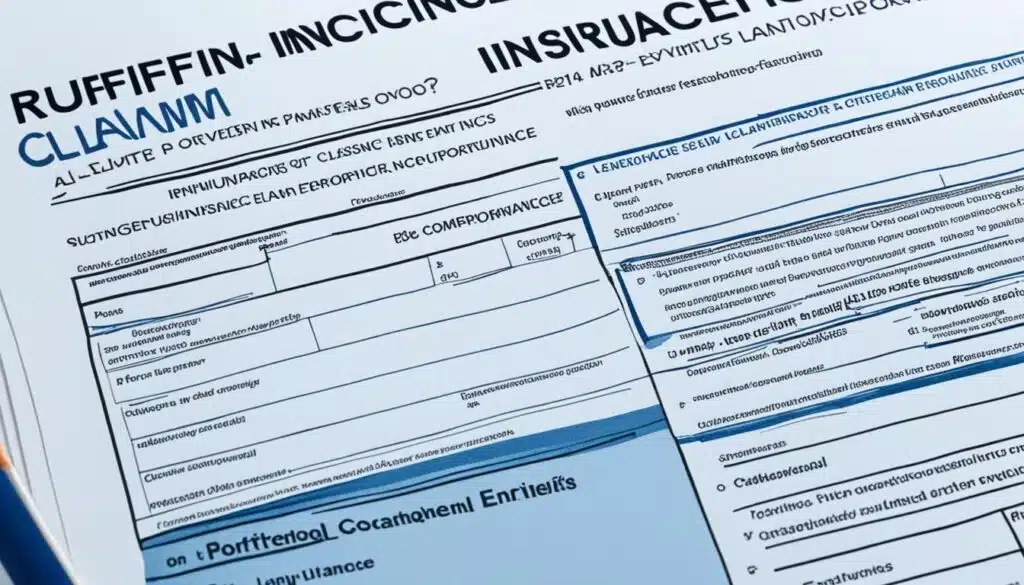Professional runoff insurance plans offer essential liability protection for professionals and businesses in various industries. This type of insurance provides coverage for claims that may arise against companies that have been acquired, merged, or have ceased operations. It acts as a safeguard, protecting the acquiring company from legal claims made against the company being acquired.
Runoff insurance is a valuable provision that applies for a certain period after the policy is active, bridging the gap between standard policies and potential future claims. It is particularly useful for professionals who offer expert advice or professional services, as it offers extended coverage beyond the policy term, even after retirement or career changes.
Key Takeaways: Professional Runoff Insurance Plans
- Professional runoff insurance plans provide liability protection for companies that have been acquired or have ceased operations.
- Runoff insurance acts as a claims-made policy, offering coverage for a certain period after the policy becomes active.
- It is crucial for professionals to understand the benefits and types of runoff coverage available to ensure comprehensive protection.
- Runoff insurance is essential for professionals and business owners, providing peace of mind and protection against future claims.
- The cost of runoff insurance varies depending on factors such as coverage type, length, and individual circumstances.
Understanding Runoff Insurance
Runoff insurance, also known as closeout insurance, is an essential component of risk management for acquiring companies. When an organization acquires another company or entity, it assumes not only its assets but also its liabilities. This includes potential legal claims and lawsuits that may arise from the actions of the acquired company.
By purchasing runoff insurance, the acquiring company can protect itself from these liabilities and indemnify against lawsuits targeting the directors and officers of the acquired company. Runoff insurance provides coverage for a specified period of time after the policy becomes active, making it crucial for professionals to understand its importance in safeguarding their interests even after retirement or career changes.
“Runoff insurance is a strategic tool for acquiring companies. It allows them to acquire entities with confidence by mitigating the potential risks associated with past actions and liabilities.” – John Smith, Risk Management Consultant
The acquiring company, sometimes referred to as the acquiring entity, procures the runoff insurance policy as part of the acquisition process. This acquisition scenario is where the acquisition entity takes over the acquired company’s assets and assumes its liabilities. The runoff insurance protects the acquiring company by providing coverage for any unforeseen claims or lawsuits arising from the acquired company’s activities. It serves as a safety net against acquiring liabilities that were not identified during the due diligence process.
To effectively comprehend the value of runoff insurance, it is crucial to understand the nature of the liabilities being acquired. These liabilities can encompass a wide range of potential claims, such as professional malpractice, product liability, employment-related lawsuits, and more. Runoff insurance ensures that the acquiring company is not left vulnerable to these claims and can continue operations without the fear of unknown liabilities surfacing in the future.
The coverage period for runoff insurance typically extends beyond the expiration date of the acquired company’s standard insurance policies. This period allows sufficient time for potential claims to be reported and addressed. It is important for professionals involved in acquisition scenarios to familiarize themselves with the intricacies of runoff insurance and understand how it can protect their interests and the stability of the acquiring entity.
Key Points about Runoff Insurance:
- Runoff insurance is purchased by the acquiring company to protect itself from the liabilities of the acquired company.
- It indemnifies the acquiring entity against potential claims and lawsuits targeting the directors and officers of the acquired company.
- Understanding runoff insurance is crucial for professionals as it offers liability protection even after retirement or career changes.
Types of Runoff Coverage
Runoff insurance can be applied to various types of insurance policies, providing extended coverage for professionals and businesses beyond the policy term. The different types of runoff coverage include:
1. Directors and Officers Insurance
Directors and Officers (D&O) insurance offers protection for directors and officers of a company against claims alleging wrongful acts in their managerial roles. It covers legal expenses and damages resulting from lawsuits, ensuring financial security for key decision-makers.
2. Professional Liability Insurance
Professional Liability Insurance, also known as Errors and Omissions (E&O) insurance, protects professionals from claims of negligence, errors, or omissions in their services. It is commonly purchased by individuals in professions such as doctors, attorneys, consultants, and architects.
3. Fiduciary Liability Insurance
Fiduciary Liability insurance provides coverage for fiduciaries, such as trustees, administrators, and investment managers, against claims alleging breaches of fiduciary duty. It safeguards their personal assets and provides financial protection in case of lawsuits related to mismanagement of employee benefit plans or retirement funds.
4. Employment Practices Liability Insurance
Employment Practices Liability Insurance (EPLI) protects employers against claims made by employees alleging discrimination, harassment, wrongful termination, or other employment-related issues. It covers legal costs, settlements, and judgments arising from such claims, safeguarding businesses from financial loss and reputational damage.
Each type of runoff coverage targets specific professional liabilities and can be tailored to meet individual needs. It is important to consult with an insurance professional to determine the appropriate coverage based on the nature of the business or profession.
| Type of Runoff Coverage | Target Audience | Key Protections |
|---|---|---|
| Directors and Officers Insurance | Company directors and officers | Protection against claims of wrongful acts in managerial roles |
| Professional Liability Insurance | Professionals in various fields | Protection against claims of negligence or errors in professional services |
| Fiduciary Liability Insurance | Fiduciaries, trustees, administrators | Protection against claims related to mismanagement of employee benefit plans |
| Employment Practices Liability Insurance | Employers | Protection against claims of discrimination, harassment, or wrongful termination |
Benefits of Runoff Insurance
Runoff insurance offers a range of benefits that provide individuals and businesses with extended coverage and peace of mind. By understanding the advantages of runoff insurance, professionals can protect themselves against future claims and liabilities, even after retirement or career changes.
One of the primary benefits of runoff insurance is the extended coverage it provides. Standard insurance policies have specific terms and expiration dates, leaving professionals vulnerable to claims that may occur after the policy term. Runoff insurance fills this gap by offering coverage for claims that arise in the future, ensuring that professionals are protected for an extended period.
Additionally, runoff insurance safeguards professionals against potential liabilities that may arise even after retirement or career changes. When individuals close their businesses or transition to new professions, they may still face lawsuits or claims related to their previous professional activities. Runoff insurance provides ongoing protection in these scenarios, ensuring that individuals are not financially burdened by unforeseen legal challenges.
One of the most valuable aspects of runoff insurance is the peace of mind it brings. Knowing that professional liabilities are covered provides individuals and businesses with a sense of security and confidence in their operations. With the potential for future claims mitigated through runoff insurance, professionals can focus on their current endeavors without the constant worry of legal repercussions.
Runoff Insurance Benefits:
- Extended coverage for claims that may arise in the future.
- Protection against liabilities even after retirement or career changes.
- Peace of mind knowing that professional liabilities are covered.
By investing in runoff insurance, professionals can enjoy the benefits of extended coverage, protection against future claims, and the peace of mind that comes with comprehensive liability protection. It is a valuable tool to safeguard individuals and businesses from potential legal and financial challenges even after their standard insurance policies expire.
Understanding Runoff Insurance vs. Extended Reporting Period
When it comes to expert liability protection, understanding the nuances of runoff insurance and extended reporting period (ERP) provisions is crucial. While both options offer coverage for claims made against professionals, they differ in terms of coverage time span and usage scenarios.
Runoff Insurance
Runoff insurance provisions can extend over several years, providing a longer coverage period compared to ERPs. This type of insurance is commonly used in acquisition scenarios, where a company acquires another company or when a business ceases operations. Runoff insurance covers claims related to wrongful acts that occurred prior to the acquisition or closure.
Extended Reporting Period (ERP)
On the other hand, ERPs are typically short-term provisions designed for specific situations. They are commonly used when switching claims-made insurers. An ERP allows professionals to report claims that arise during the ERP timeframe, even if the wrongful act occurred prior to the policy’s expiration or cancellation.
Understanding the differences between runoff insurance and ERPs is essential for professionals looking to protect themselves against potential liabilities. The table below further illustrates the distinctions between these two options:
| Runoff Insurance | Extended Reporting Period (ERP) |
|---|---|
| Coverage Time Span | Several years (can vary) |
| Policy Type | Acquisition scenarios or company closure |
| Usage Scenarios | Switching claims-made insurers |
As you can see, while both runoff insurance and ERPs offer valuable coverage, they cater to different needs and situations. Professionals should carefully analyze their circumstances to determine which option aligns best with their specific requirements.
Who Needs Runoff Insurance?
Runoff insurance is an important consideration for professionals, business owners, and retirees who provide expert advice or professional services. It offers valuable protection against potential claims or liabilities that may arise, even after retiring or changing careers.
Professionals, such as doctors, lawyers, accountants, and consultants, who provide specialized services, are exposed to unique risks. While their standard professional liability insurance may cover claims during the policy term, it may not provide protection for claims made after the policy expires. This is where runoff insurance becomes crucial.
Business owners who have closed their businesses or have been acquired by another company also benefit from runoff insurance. When businesses are closed or acquired, there is a possibility of future claims related to the acquired company’s activities. Runoff insurance ensures that any potential claims are covered, providing peace of mind for business owners even after the business has ceased operations or been acquired.
Retirees, in particular, can benefit greatly from runoff insurance. After retiring, professionals may still face claims related to their previous services. Runoff insurance provides them with the necessary protection and prevents potential financial burdens during their retirement years.
“Runoff insurance offers a safety net for professionals, business owners, and retirees who want to safeguard their personal and financial interests. It ensures that individuals are protected from potential liabilities well beyond the expiration of their standard insurance policies.”
If you fall into any of these categories, considering runoff insurance is a wise decision to protect yourself from unexpected liabilities and claims. It offers extended coverage that goes beyond the expiration of your standard policies, providing you with the necessary protection and peace of mind.
How Much Does Runoff Insurance Cost?
The cost of runoff insurance is determined by several factors, including the type of coverage, the length of the runoff provision, and the individual’s specific circumstances. Premiums for runoff insurance are typically established in advance and can be prepaid for a certain number of years. Each runoff insurance policy is underwritten and quoted on a case-by-case basis, ensuring that the cost is tailored to the unique needs and risks of the insured.
The premium for runoff insurance is influenced by the type of coverage selected. Different types of professional liability insurance may have varying premiums based on the level of risk associated with the specific profession or industry. Directors and officers insurance, professional liability insurance, fiduciary liability insurance, and employment practices liability insurance all have distinct premiums that reflect the coverage they provide.
The length of the runoff provision also affects the cost of the insurance. The longer the coverage period, the higher the premium may be. This is because extending the coverage beyond the standard policy term requires additional protection and exposes the insurer to potential claims for an extended period of time.
Finally, an individual’s specific circumstances, such as their professional experience, claims history, and risk profile, can impact the cost of runoff insurance. Insurers will evaluate these factors to determine the premium that best aligns with the individual’s needs and level of risk.
“The cost of runoff insurance can vary significantly depending on the specific details of the coverage, including the type of policy and the length of the provision. It is essential for individuals and businesses to assess their needs and work with insurance providers to obtain accurate quotes tailored to their unique circumstances.”
Runoff Insurance Example
To better understand how runoff insurance works, let’s take a look at an example policy:
An example of a runoff insurance policy could be a policy with a term from January 1, 2017, to January 1, 2018, and a 5-year runoff provision.
In this scenario, coverage will apply to all claims caused by wrongful acts committed between January 1, 2017, and January 1, 2018, that are reported to the insurer from January 1, 2018, to January 1, 2023.
The runoff provision extends the coverage period beyond the policy term, allowing individuals or businesses to be protected against potential claims even after their standard insurance policies expire.
This example highlights the importance of the coverage period, which determines the time span during which a policy provides protection. In this case, the coverage period spans from January 1, 2017, to January 1, 2018, while the runoff provision extends it for an additional 5 years.
Also Read:- Secure Your Future with a Life Insurance Agent
Furthermore, this example underlines the claims-made nature of runoff insurance. Claims must be reported to the insurer within a specific timeframe (in this case, from January 1, 2018, to January 1, 2023) for them to be eligible for coverage.
Runoff Insurance Example
| Policy Term | Coverage Period | Claims Reporting Period |
|---|---|---|
| January 1, 2017 – January 1, 2018 | January 1, 2017 – January 1, 2018 (Policy Term) January 1, 2018 – January 1, 2023 (Runoff Provision) |
January 1, 2018 – January 1, 2023 |
This table summarizes the key details of the example runoff insurance policy, showcasing the policy term, coverage period, and claims reporting period.
By understanding this example, individuals and businesses can grasp how runoff insurance works, particularly in terms of coverage timeframes, claims reporting, and the extension of protection beyond the policy term.
Conclusion
Runoff insurance is an essential aspect of expert liability protection, providing coverage for claims made against companies that have been acquired or have ceased operations. This specialized insurance plan offers extended coverage for professionals and business owners, safeguarding them against potential liabilities even after retirement or career changes.
By understanding the different types of coverage available, individuals can tailor their runoff insurance plans to suit their specific needs. Whether it’s directors and officers insurance, professional liability insurance, fiduciary liability insurance, or employment practices liability insurance, having the right coverage ensures comprehensive protection.
While the cost of runoff insurance varies depending on factors such as coverage type and length, it is an investment that offers peace of mind and long-term protection. Professionals and business owners can rest assured knowing that their liability concerns are addressed, enabling them to focus on their current and future endeavors.
For those seeking robust and reliable liability protection, runoff insurance is a valuable tool. With its extended coverage, it provides professionals and business owners with the reassurance that they are safeguarded against potential claims even after their standard insurance policies expire.
FAQs
Q: What is runoff insurance coverage?
A: Runoff insurance coverage is a type of professional liability insurance that provides protection for future claims that may arise after the policy period has ended.
Q: What does professional indemnity insurance cover?
A: Professional indemnity insurance covers claims arising from professional negligence or errors, protecting professionals against financial liabilities.
Q: How does runoff insurance protect professionals?
A: Runoff insurance protects professionals by providing coverage for claims made after their regular professional indemnity policy has expired, ensuring they are safeguarded from potential future risks.
Q: What is the concept of runoff insurance?
A: The concept of runoff insurance involves purchasing additional insurance to cover claims that may arise in the future after the expiration of a standard professional indemnity policy.
Q: Why is considering runoff insurance important for professionals?
A: Considering runoff insurance is important for professionals as it ensures continued protection against liabilities even after their regular insurance policy has lapsed, reducing financial risks associated with future claims.
Q: What is the importance of professional indemnity in professional liability protection?
A: Professional indemnity is crucial in professional liability protection as it offers financial coverage and legal support in case of claims made against a professional for errors, omissions, or negligence in their services.
Q: How do runoff provisions normally encompass multi-year policies?
A: Runoff provisions normally encompass multi-year policies by extending coverage beyond the policy period, ensuring professionals are protected against future claims for an extended period of time.










